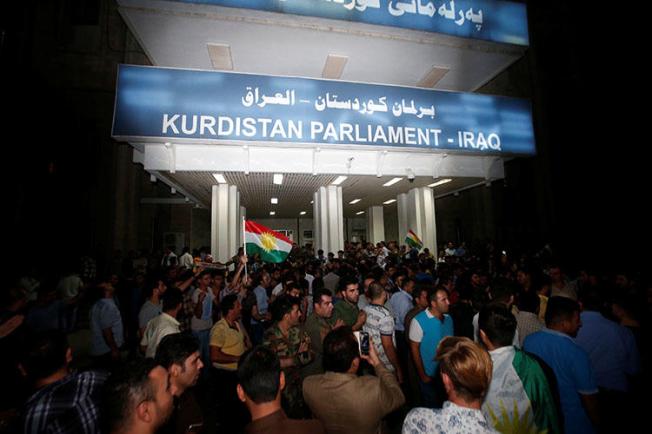At least 15 journalists were assaulted and seven detained while covering widespread protests across Kurdish-controlled northern Iraq between March 25 and March 27, according to CPJ research and local press freedom and human rights groups. The wave of detentions and assaults has sparked fear among local journalists and press freedom groups that Kurdish authorities will apply a heavy hand in the lead-up to elections. CPJ’s Emergencies Response Team (ERT) has issued the following advisory for journalists working in the region.
The fallout from an annulled Kurdish independence referendum in 2017 has further fragmented the divided political landscape in Kurdistan. The two main parties, the Kurdish Democratic Party (PDK) and the Kurdish Patriotic Union (PUK), face unprecedented unpopularity that has led to a proliferation of political splits and the rise of new parties to challenge the status quo. Meanwhile, Iraqi parliamentary elections and a Kurdish general election are expected, respectively, for May and September 2018. CPJ research shows that the media are vulnerable whenever internal political tensions flare in Iraqi Kurdistan.
On March 24, Kurdish public servants took to the streets to protest corruption and austerity measures they say have resulted in unpaid salaries. The protests are ongoing. Demonstrators have been beaten and harassed, according to Amnesty International. Between March 25 and 27, at least 15 journalists covering the protests were assaulted and some had their equipment snatched by security forces, including officers with the Kurdish security services, Asayish, who were mixed in with the protesters, sometimes in uniform and sometimes in plainclothes, according to two journalists present. Seven journalists were detained and held for hours, they told CPJ. The latter had their equipment confiscated, and their memory cards and mobile phones erased. According to CPJ research, the journalists who were beaten and detained work for news organizations mostly associated with the political opposition.
The exact date has not been set for the Kurdish presidential elections expected in September, but as the campaign heats up, there are likely to be more rallies and potential protests. Journalists covering events are advised to follow this advice:
Prepare ahead of the assignment:
- Plan the assignment and ensure that you have a full battery on your cell phone. If you have a lot of sensitive material on your personal phone, consider taking a clean device that can be lost if necessary.
- Know the area to which you are going. Work out in advance what to do in an emergency.
- Always try to work with a colleague and have a regular check-in procedure with your base. Have a pre-recorded text message ready to go to indicate the situation is deteriorating or if arrest is imminent. Ensure that your colleagues understand what to do in case of arrest. Consider having legal assistance on standby to make enquiries about you should you not check in.
- Wear clothing and footwear that allow you to move swiftly. Avoid loose clothing and lanyards that can be grabbed, as well as flammable material, such as nylon. Press identification may deter hostile action directed at you by the security forces. However, if possible avoid branding specific to any particular news organization, particularly if it may make you a target. Always carry accreditation to produce if questioned by the authorities.
- Consider your position. Ideally find an elevated position that may offer greater safety. If working in a crowd, plan a strategy. Try to keep to the outside of the crowd and avoid the middle, where it is hard to escape. Identify an escape route.
- At any location, always plan an evacuation route. If working with others, select an emergency rendezvous point.
- Maintain situational awareness at all times and limit valuables in your possession.
- Given the climate, journalists should also be aware of the potential sensitivity regarding quoting sources at these protests who may fear the repercussions of being identified.
When dealing with aggression:
- Read body language and use your own body language to pacify a situation.
- Keep eye contact with an aggressor, use open hand gestures, and keep talking with a calming manner.
- Keep an extended arm’s length from the threat. Back away and if someone grabs hold of you, break away firmly without aggression. If cornered and in danger, shout.
- If the situation escalates, keep a hand free to protect your head and move with short, deliberate steps to avoid falling. If in a team, stick together and link arms.
- Be aware of the situation and your own safety. While there are times when documenting aggression can be newsworthy, taking pictures of aggressive individuals can escalate a situation.
In August 2017, the CPJ Emergencies Team issued a safety advisory warning of the dangers of the rise of militias and fragmentation of control following Islamic State’s defeat. Any international journalist planning to travel to contested areas in Iraq should also read this article about the rise of checkpoints from New York Times former Baghdad Bureau Chief Alissa Rubin.
CPJ encourages local, freelance journalists and media organizations covering the protests in Kurdistan to closely follow the safety principles and practices of the ACOS alliance, which can be found here.
EDITOR’S NOTE: The spelling of Alissa Rubin’s name has been corrected in the penultimate paragraph.
